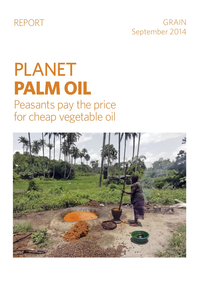Media release
13 December 2014
Planet palm oil: peasants pay the price for cheap vegetable oil
Cultivation of oil palms is expanding rapidly around the world. New monoculture plantations mean brutal land grabbing, the destruction of rainforests and the exploitation of workers.

"The new wave of land grabs is seeing local communities around the world lose access to vital land and water resources," says GRAIN researcher Devlin Kuyek. "They also have to face all the impacts that come with the creation of vast monoculture plantations within their territories – pollution from pesticides, soil erosion, deforestation, and labour migration."
The industrial plantation model concentrates control and profits in the hands of a few multinational companies. It maximises profit by exploiting labour and the environment. By contrast, the African model – largely in the hands of rural women – serves local markets and is based on agroecological practices and biodiversity.
"In Guinea, the oil palm sector is still a source of stable employment, and helps stem the exodus from rural areas and develop the local economic fabric," says one of the contributors to the report, Alphonse Yombouno of the NGO ADAPE-Guinée.
Rising demand for palm oil is driven by the rapid expansion of multinational food companies and supermarkets in the global South, as well as by the signing of free trade agreements that make it easier to replace locally-produced animal or vegetable oils with palm oil. National mandates for biofuels, especially in Europe, are yet another factor.
Oil palm plantations are also a hot target for speculative investors, whether from agribusiness, pension funds or corrupt tycoons looking for ways to launder funds.
With palm oil companies finding lands in Indonesia and Malaysia more difficult to acquire, attention is shifting to Africa. Over the past fifteen years, foreign companies have signed over 60 deals covering nearly 4 million hectares in central and western Africa for the development of oil palm plantations. The land grabs are already generating violent conflicts in several African countries.
The situation in Africa is a reminder that this is not simply about land. It is about a larger struggle over food systems and models of development. Will African palm oil be produced by African peasants or multinational corporations? Will palms be grown on mixed farms and semi-wild palm groves – or will peasants be driven out to make way for large scale, industrial plantations?
"Tens of millions of women and men – along with the oil palms they look after and their traditional systems of production – are at tremendous risk due to the global land grab for oil palm plantations," says GRAIN researcher Jeanne Zoundjihékpon. "Resistance, for them, is not just a matter of holding onto their lands and forests. It is also a fight for their livelihoods, their cultures, their biodiversity and their food sovereignty."
These questions have implications beyond Africa. If the continent becomes a new frontier for low cost palm oil production, exports from Africa will affect farmers growing vegetable oil crops in other countries, such as India and Mexico.
Read the report: grain.org/e/5031
Contacts
Ange David Baimey, Abidjan (FR)
+233 269 089 432
[email protected]
Kadidja Koné, Abidjan (FR)
+225 05 87 04 59
[email protected]
Devlin Kuyek, Montreal (EN, FR)
+1514 571 7702
[email protected]
Kartini Samon, Jakarta (EN)
+628 131 476 1305
[email protected]